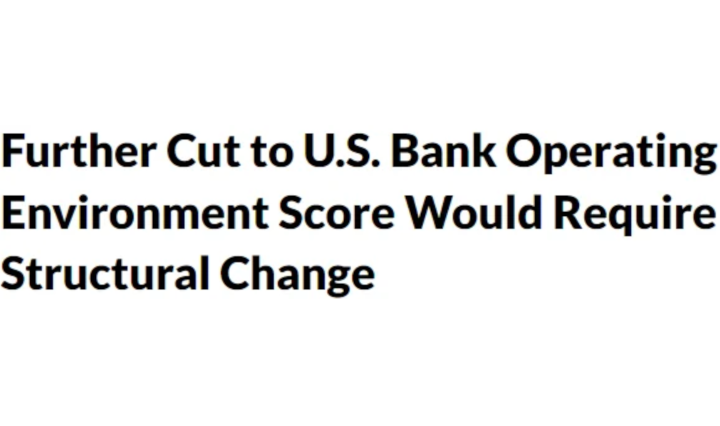"These vulnerabilities will remain for some time." Fitch Ratings lowered the operating environment score for U.S. banks in June to ‘aa-‘ from ‘aa’


Fitch Ratings-New York-17 August 2023: Fitch Ratings lowered the operating environment (OE) score for U.S. banks in June to ‘aa-‘ from ‘aa’ mainly due to structural uncertainty around the path and rate of monetary tightening and gaps in in the regulatory framework. The lowering of the OE score did not negatively affect the ratings of U.S. banks over the near term, however, ratings headroom was reduced. Based on our latest assessment, the U.S. banking OE score is firmly situated at ‘aa-’. The Outlook on the score is ‘Stable’, meaning we are not expecting it to be revised downwards over the medium term.
Operating environment scores capture our assessment of a bank’s particular jurisdiction to generate business volumes while taking an acceptable level of risk. Our starting points for a jurisdiction’s implied OE are GDP per capita, due to its usually close correlation to corporate earnings and household income levels, and Fitch Solutions’ Operational Risk Index, which captures the challenges of operating a business in a given jurisdiction focusing on four main risk areas: labour market, trade and investment, logistics and crime & security. The implied OE may be positively or negatively adjusted based on macroeconomic factors, structural elements and regulatory environment, among others.
A further reduction in the U.S. OE score would require evidence of sustained and structural changes of the bank operating environment that could negatively affect our assessment of banks’ creditworthiness. These could include material uncertainty around the macro environment, failure to address regulatory gaps, materially negative credit implications stemming from high private-sector indebtedness and a higher-for-longer interest rate scenario above our base case.
Moreover, further action on the OE would be informed by the interplay between inflation, interest rates and implications from the Fed’s quantitative tightening (QT). This would ultimately influence bank fundamentals such as mix and cost of deposits, greater reliance on wholesale borrowing and lending capacity.
Importantly, the OE constrains, but does not necessarily cap ratings. While not currently our expectation, in the event of a one-notch reduction of the U.S. OE from ’aa-’ to ’a+’ ratings could be recalibrated, as banks are not generally rated higher than the OE. Notably, this would cause the bank OE to fall beneath the ratings for ‘aa-‘-rated issuers such as Bank of America, Bank of New York Mellon, JPMorgan and State Street. In addition, a one-notch downgrade of the OE would revise Fitch’s financial performance benchmarks for banks and would lead to lower implied financial profile scores, all else equal.
The failure of three U.S. banks earlier this year brought into focus several vulnerabilities in the regulatory framework that failed to address significant asset/liability mismatches, deposit concentrations/outflow vulnerabilities and regulatory lapses, which our recent downgrade of the OE incorporates.
We expect a number of regulatory changes related to capital and liquidity requirements to be implemented. These changes are likely to be phased in over a number of years, which means these vulnerabilities will remain for some time. While tighter regulation is generally viewed as a credit positive for U.S. banks, it is uncertain to what degree these regulatory changes will affect the competitiveness of non-GSIB banks, or result in materially lower profitability through market cycles. On balance, though, enhanced regulatory requirements would be viewed positively in our assessment of the OE.
TLDRS:
- Fitch lowered the operating environment score for U.S. banks in June to ‘aa-‘ from ‘aa’
- 'Strong and resilient', huh?
- "The failure of three U.S. banks earlier this year brought into focus several vulnerabilities in the regulatory framework that failed to address significant asset/liability mismatches, deposit concentrations/outflow vulnerabilities and regulatory lapses, which our recent downgrade of the OE incorporates."
- "We expect a number of regulatory changes related to capital and liquidity requirements to be implemented. These changes are likely to be phased in over a number of years, which means these vulnerabilities will remain for some time."
- "Further action on the OE would be informed by the interplay between inflation, interest rates and implications from the Fed’s quantitative tightening (QT). This would ultimately influence bank fundamentals such as mix and cost of deposits, greater reliance on wholesale borrowing and lending capacity."



